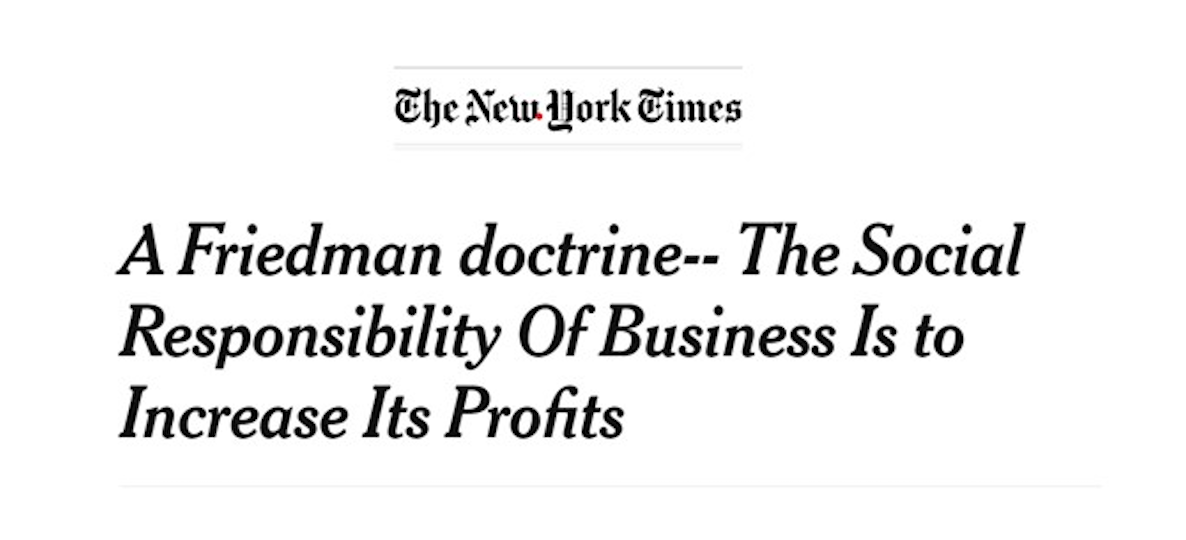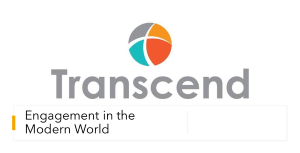In His Own Words, Milton Friedman Supported Stakeholder Capitalism
 With Stakeholder Capitalism thrust into the national limelight by Vivek Ramaswamy, the third declared Republican national presidential candidate, it has become essential to ensure that a non-partisan field born at the front lines of business and academia does not become distorted and delayed by partisan politics. Given that Stakeholder Capitalism is simply better business, the political turmoil could set back a practical approach to business of which the oracle of capitalism clearly approved.
With Stakeholder Capitalism thrust into the national limelight by Vivek Ramaswamy, the third declared Republican national presidential candidate, it has become essential to ensure that a non-partisan field born at the front lines of business and academia does not become distorted and delayed by partisan politics. Given that Stakeholder Capitalism is simply better business, the political turmoil could set back a practical approach to business of which the oracle of capitalism clearly approved.By Bruce Bolger
Editors note: This article was originally planned to run as an opinion piece but an analysis of Milton Friedman’s language, statements, and independent analysis by others of his work provides such a compelling argument that the conclusion withstands reasonable journalist standards.
Martin Friedman Took Stakeholder Interests Seriously But Disdained Grand-Standing
The Debate Remains Unchanged in 52 Years
 The presidential candidate Vivek Ramaswamy is basing his campaign in part on opposition to Stakeholder Capitalism without a clear definition of his strawman. What he apparently fails to recognize is that Stakeholder Capitalism is a decades-old, non-partisan movement that is simply better business, and that Milton Friedman obviously would have approved.
The presidential candidate Vivek Ramaswamy is basing his campaign in part on opposition to Stakeholder Capitalism without a clear definition of his strawman. What he apparently fails to recognize is that Stakeholder Capitalism is a decades-old, non-partisan movement that is simply better business, and that Milton Friedman obviously would have approved.The Enterprise Engagement Alliance, publisher of ESM, is non-partisan, so only enters into a political discussion because Stakeholder Capitalism became dragged into political debate with an incorrect definition.
Stakeholder Capitalism is about enhancing returns for investors only by creating value for employees, customers, distribution and supply chain, distribution partners and communities. The only social obligation of companies is to not externalize on to society the costs of underpaying employees, deceiving, or endangering customers, or damaging the infrastructure of or polluting communities. These actions amount to unfunded mandates in this case imposed by business on communities of which Milton Friedman would have disagreed consistent with his opposition to CEOs’ imposing taxes on shareholders. The conflation with “woke” capitalism and distortion of Friedman’s work, based perhaps in part on the catchiness of the New York Times headlines writer for the Sunday magazine's cover story, is the result of politics and has no basis in fact or history.
Martin Friedman Took Stakeholder Interests Seriously But Disdained Grand-Standing
Writes Alex Edmans, in a 2020 Oxford Business Law blog post, “By presenting Friedman as a narrow-minded caricature, critics of capitalism can then push their own theory of how it should operate, and it’s not difficult to argue that theirs’ is superior when the alternative has been presented as a straw man. But Friedman never advocated that companies exploit stakeholders. He argued that it is legitimate for a company to focus on increasing profits because the only way it can do so, at least in the long term, is if it treats stakeholders seriously.”
Similarly, Sarah Keohane Williamson, CEO of FCLTGlobal, a not-for-profit research firm focused on the value of long-term investing, writes in a recent Fortune article, “A careful reading of Milton Friedman’s New York Times magazine essay, The Social Responsibility of Business Is to Increase Its Profits, shows that even he understood the importance of what we would call Stakeholder Capitalism today.”
How? Yes, Milton Friedman writes, the purpose of a corporation is to enhance profits, but he adds important caveats. They must act ethically and without fraud. Any social benefits actions must align with corporate purpose, and as a result it’s hypocritical (in today’s language “greenwashing”) to brag about them as a form of social responsibility. These are the basic principles of Stakeholder Capitalism. Click here for a "cheat sheet" recently created by the EEA to help clear up confusion being created by the growing political debate.
The Debate Remains Unchanged in 52 Years
A reread of Friedman’s historic article is particularly meaningful because it sounds eerily contemporary.
Friedman writes, “Of course, in practice the doctrine of social responsibility is frequently a cloak for actions that are justified on other grounds rather than a reason for those actions. To illustrate, it may well be in the long‐run interest of a corporation that is a major employer in a small community to devote resources to providing amenities to that community or to improving its government. That may make it easier to attract desirable employes, it may reduce the wage bill or lessen losses from pilferage and sabotage or have other worthwhile effects. Or it may be that, given the laws about the deductibility of corporate charitable contributions, the stockholders can contribute more to charities they favor by having the corporation make the gift than by doing it themselves, since they can in that way contribute an amount that would otherwise have been paid as corporate taxes.”
What Friedman correctly objects to is CEOs who make decisions affecting use of profits based on addressing the causes of the CEO, which might not be shared by all shareholders or stakeholders for that matter. If the CEO “does this, he is in effect imposing taxes, on the one hand, and deciding how the tax proceeds shall be spent, on the other.” Of course, shareholder capitalists make enormous donations to political and other causes and underwrite lobbyists and lawyers, often without shareholder approval.
Stakeholder Capitalism advocate, Leo E. Strine Jr., former Delaware Supreme Court Justice and now Of Counsel at the law firm Watchell, Lipton, Rosen, and Katz, apparently agrees with Friedman. He unequivocally states corporations should stay out of politics or social issues unless the issues are directly related to the organization’s stated purpose. Any other such activities require shareholder approval in his mind.
In his famous essay, Friedman states, “There is one and only one social responsibility of business—to use its resources and engage in activities designed to increase its profits so long as it stays within the rules of the game, which is to say, engages in open and free competition without deception or fraud.” Most Stakeholder Capitalists probably would agree.
Clearly, as the authors Alex Edmans and Sarah Keohane Williamson have concluded, Friedman would at least not have objected to the Stakeholder Capitalism approach to enhancing returns for investors by creating value for employees, customers, supply chain and distribution partners and communities.
However, it’s obvious he would not have approved of organization’s offloading their human resources, safety, and environmental costs onto taxpayers either. As much as Friedman objects to CEOs imposing costs on to shareholders to pursue pet interests, it’s clear he would object to companies “in effect imposing taxes” on society by underpaying employees or having them work in unsafe conditions so the workers endure higher risks and need public welfare, food stamps, or subsidized health care to survive; selling dangerous or deceptive products that lead to physical or other harm, inconvenience, and law suits, and pollution or infrastructure damage left to local communities to live with or clean up. These would appear to fall within his definition of unethical behavior or fraudulent behavior consistent with his distaste for companies involved in corporate responsibility inconsistent with profit creation or shareholder approved donations.
Stakeholder Capitalism doesn’t require corporations to address social ills, only not to create or contribute to them through fraudulent and deceptive actions and imposing what are in effect unfunded mandates on to their stakeholders and communities.
A year before his death, Milton Friedman reportedly told the audience at a Conscious Capitalism Conference, “The differences between John Mackey (Whole Foods and Conscious Capitalism founder) and me regarding the social responsibility of business are for the most part rhetorical....Strip off the camouflage, and it turns out we are in essential agreement.”
Were this not enough proof, a still living long-time luminary of shareholder capitalism in the last century Harvard Business School Professor Emeritus Michael C. Jensen now says in the movie Fishing With Dynamite: “Shareholder capitalism is stupid: Stop it.”
Subscribe to ESM's weekly newsletter.
 Profit From the “S” of Environmental, Social, Governance (ESG)
Profit From the “S” of Environmental, Social, Governance (ESG)Through education, media, business development, advisory services, and outreach, the Enterprise Engagement Alliance supports boards, business analysts, the C-suite, management in finance, marketing, sales, human resources and operations, etc., educators, students and engagement solution providers seeking a competitive advantage by implementing a strategic and systematic approach to stakeholder engagement across the enterprise. Click here for details on all EEA and RRN media services.
1. Professional Education on Stakeholder Management and Total Rewards
-
 Become part of the EEA as an individual, corporation, or solution provider to gain access to valuable learning, thought leadership, and marketing resources.
Become part of the EEA as an individual, corporation, or solution provider to gain access to valuable learning, thought leadership, and marketing resources. - The only education and certification program focusing on Stakeholder Engagement and Human Capital metrics and reporting, featuring seven members-only training videos that provide preparation for certification in Enterprise Engagement.
- EEA books: Paid EEA participants receive Enterprise Engagement for CEOs: The Little Blue Book for People-Centric Capitalists, a quick implementation guide for CEOs; Enterprise Engagement: The Roadmap 5th Edition implementation guide; a comprehensive textbook for practitioners, academics, and students, plus four books on theory and implementation from leaders in Stakeholder Management, Finance, Human Capital Management, and Culture.
- ESM at EnterpriseEngagement.org, EEXAdvisors.com marketplace, ESM e–newsletters, and library.
- RRN at RewardsRecognitionNetwork.com; BrandMediaCoalition.com marketplace, RRN e-newsletters, and library.
- EEA YouTube Channel with over three dozen how-to and insight videos and growing with nearly 100 expert guests.
Strategic Business Development for Stakeholder Management and Total Rewards solution providers, including Integrated blog, social media, and e-newsletter campaigns managed by content marketing experts.
4. Advisory Services for Organizations
Stakeholder Management Business Plans; Human Capital Management, Metrics, and Reporting for organizations, including ISO human capital certifications, and services for solution providers.
5. Outreach in the US and Around the World on Stakeholder Management and Total Rewards
The EEA promotes a strategic approach to people management and total rewards through its e-newsletters, web sites, and social media reaching 20,000 professionals a month and through other activities, such as:
- Association of National Advertisers Brand Engagement 360 Knowledge Center to educate brands and agencies.
- The EEA Engagement widget to promote, track, and measure customers/employee referrals and suggestions that can be connected to any rewards or front-end program management technology.
- The Stakeholder Capitalism free insignia to promote a commitment to better business.
- The BMC Brand Club and transactional storefronts to educate corporate and agency buyers on the IRR market.
- The EME Gold program to educate the top 3% of promotional consultants on selling engagement and rewards services.

















